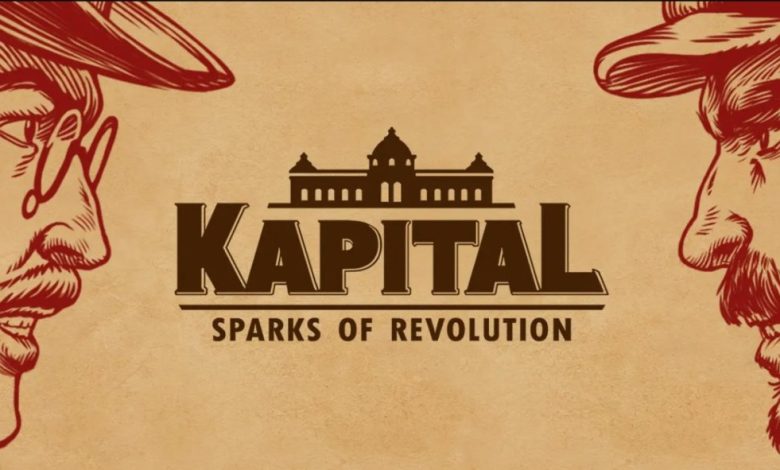
Europe is in crisis. Poverty and huge social differences are dividing society in the aftermath of a devastating war. The needs of production require flexible workers in miserable living conditions, which bring pandemics and death. No, we are not referring to the farce of the 21st century but to the tragedy of the early 20th century which is the historical context of Kapital: Sparks of Revolution.
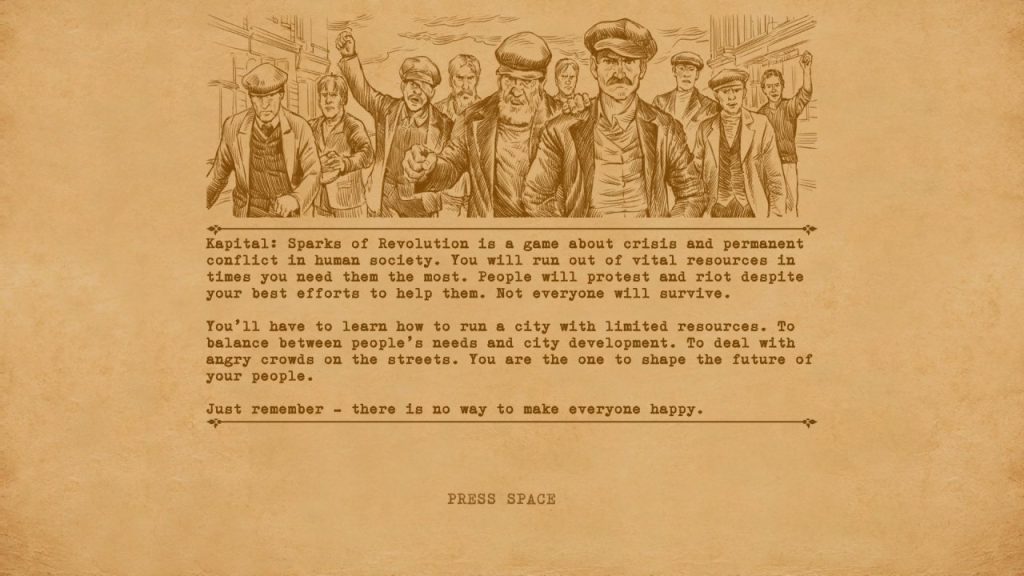
Our title comes from Lapovich, a multi-ethnic group of Belarusians, Russians, Ukrainians and other formerly fraternal peoples. Its historical context is the end of the Great War and the enormous social and political changes that this great tragedy brought. However, there is no accurate depiction of the place and time. Our city could be any industrialized city in Europe and the time frame contains nuggets from 1848 to the October Revolution.
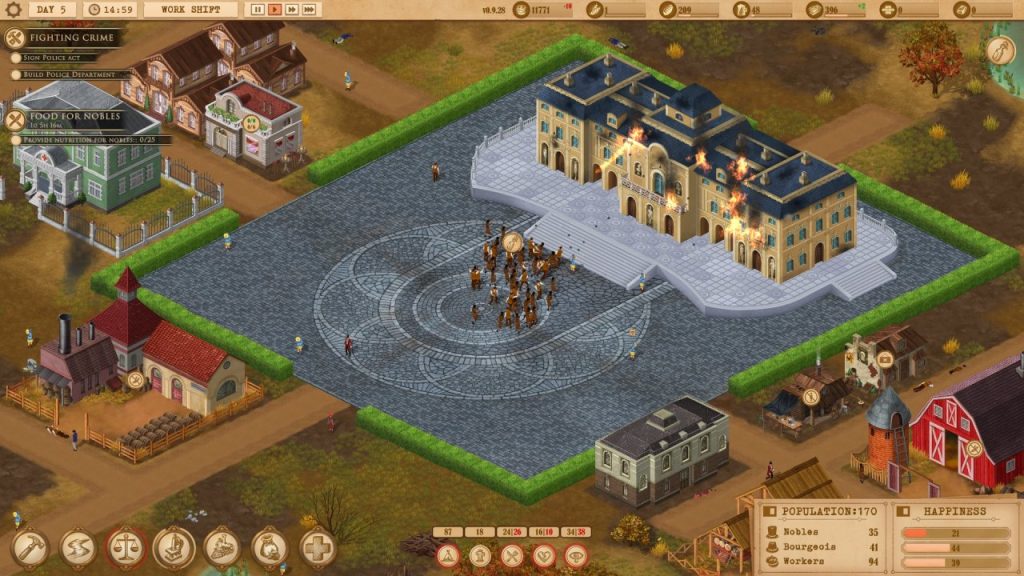
Our role as the elected mayor of the place is to restore industry after the destruction of the war and at the same time to ensure both the prosperity of all citizens and to maintain social cohesion, without the city slipping into an ill-conceived anarchy.
In order to achieve the right balance, we need to take into account the needs of each of the three classes that live, produce or live in our city. These are the working class, which mans our factories, the bourgeoisie, which staffs phony positions in markets and stock exchanges but is nevertheless the only one who pays taxes, and finally the old aristocracy, which staffs all the administrative machinery and high-level academic positions.
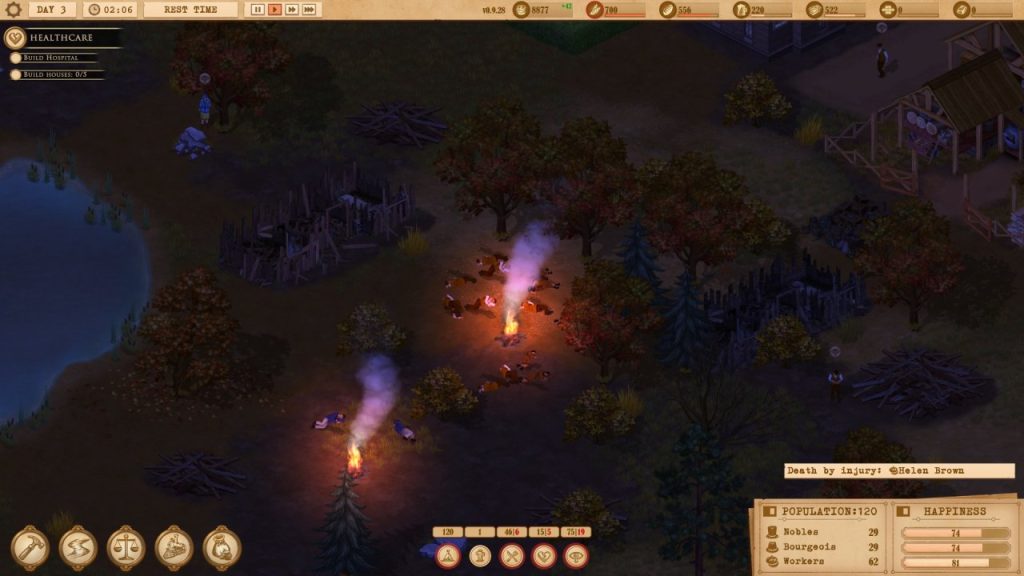
What the title mainly wants to simulate is the class struggle and the contrasts between social groups. These inevitably lead them to conflict and lead us to choose between the interests of the functioning of the city or... personal morality. In the main Campaign which has a narrative mood versus the free sandbox offered, we gradually find ourselves in an environment of increasing challenges, with very limited resources. The economy will need to be sustainable to continue the city's operation, but whether this can happen on the basis of human-to-human exploitation is up to us as mayor to define.
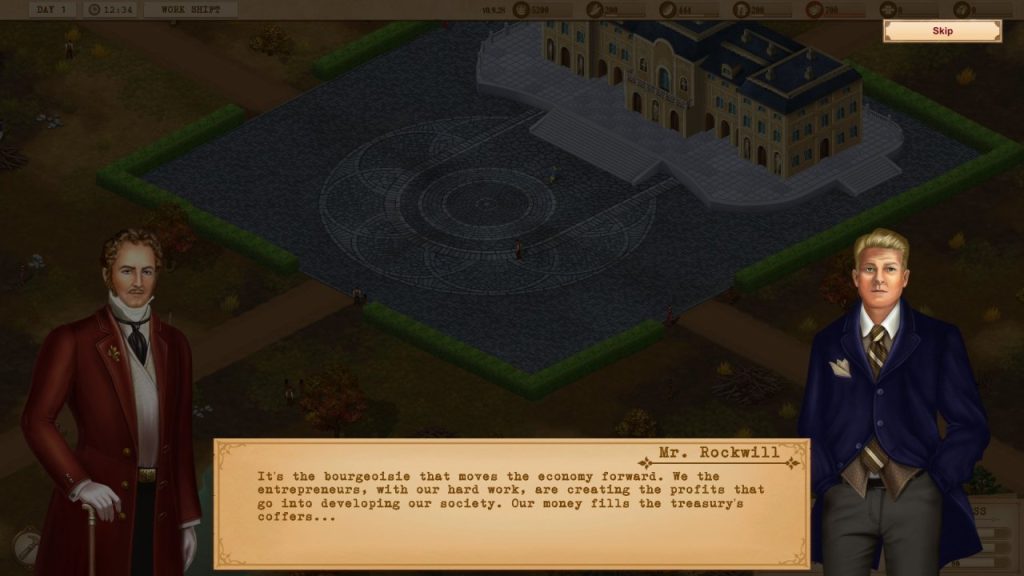
These as gameplay translate as follows: Kapital: SoR is a mix of Anno, Tropico and other modern city sims like Frostpunk. The basis of the economy is primarily Capital, necessary to run the factories which in turn produce the raw materials for more complex products, as well as basic necessities such as food or alcohol. If we try to meet the needs of our citizens to an absolute degree, we will soon go bankrupt and everyone will take to the streets with placards demanding our head. So we must navigate a logic of crisis management, appeasing the angry class of the day and ultimately when all fails to the monopoly of state violence to break up any demonstration or conspiracy against our power. And yes, we will see things as bogus as marches of nobles and bourgeois throwing Molotov cocktails at the police, but something we eventually accept as convention.
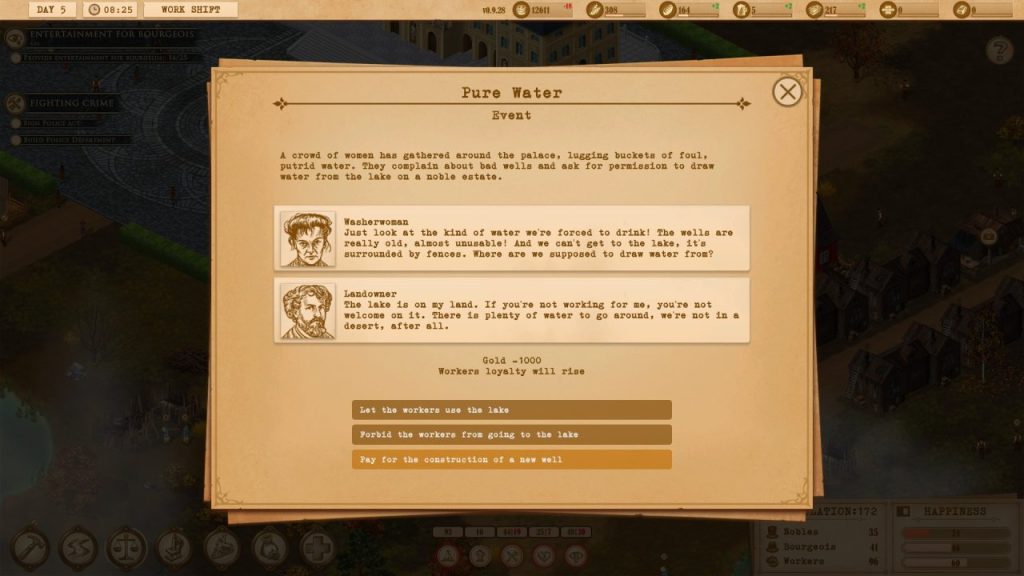
The days are divided into three parts. 8 hours of work, 8 hours of leisure and 8 hours of rest. On each day we can bring resolutions which regulate the lifestyle of the subjects. For example, in order to serve the needs of production, double-shift work is enacted, which satisfies the bourgeois factory owners and displeases the workers who break their backs fort pennies. As these resolutions become more and more complex we end up on paths of complicity with any of the three classes and gradually to the end of the game. This is brought about by the final victory and the complete dictatorship of one class over the others.
The visual framework in which this conflict takes place is a 2D, late 90's aesthetic reminiscent of Railroad Tycoon, forerunner of the Tropico series. As...Spartan as this may be considered, it personally completely covered me in identifying each building, UI elements and figuring out which social group is throwing Molotov cocktails at the town hall. Still, I can't say I didn't encounter any bugs. For example, even though I had suppressed a revolution the buildings remained in "siege" mode, practically non-functional. There were even total game crashes of which I had 3-4 along with a corrupted save game.
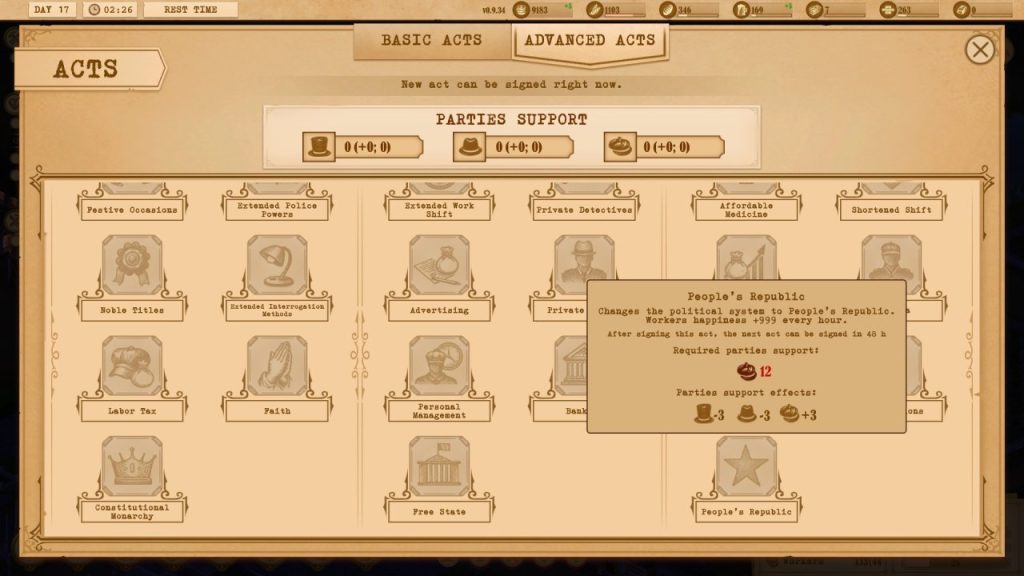
The issue of the level of difficulty should be noted here. Easy is well... really easy and serves mainly for narration and learning the mechanics. In normal the difficulty increases dramatically and despite 2 attempts I was unable to reach the end of the main Campaign. For hard, I dare not think what crisis conditions the player may face. Some may enjoy the pleasure of the tyranny that the brutal GIT GUD gives, but my experience on normal was that it can be unfair due to the ambiguity of key mechanics such as the arrival of trains supplying the town with the most basic raw material, wheat. In normal mode, at times the whole mechanism seemed to get stuck with no obvious explanation which led to "ragequit" and loss of all the laborious work up to that point.
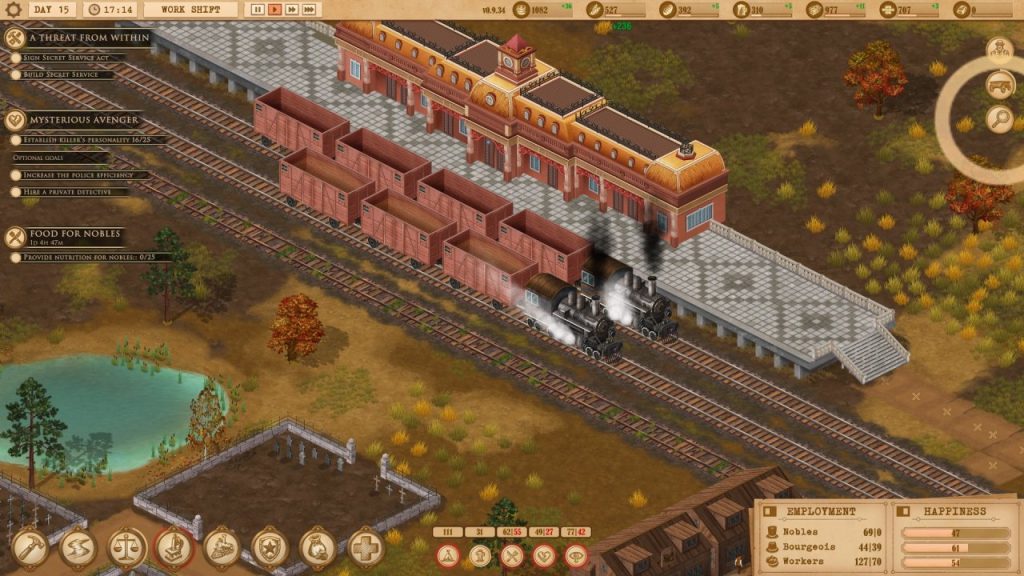
Having played a great many newer city builder sims that look to the past, including the excellent Anno 1800 and Surviving Mars, I have to say that while I initially found Kapital: SoR a bit lacking, I ended up spending 18 hours of challenge and several chuckles at its poignant humour. It feels more like a challenging tabletop with a very competent narrator, which will keep you going for 3-4 campaigns that will take you to fully explore, which translates to 20 hours of fun for a genre devotee.
RATING - 80%
80%
People's City Builder
A raw, not without its problems, but honest indie city builder that offers the special atmosphere of the crisis and political ferment of the early 20th century.
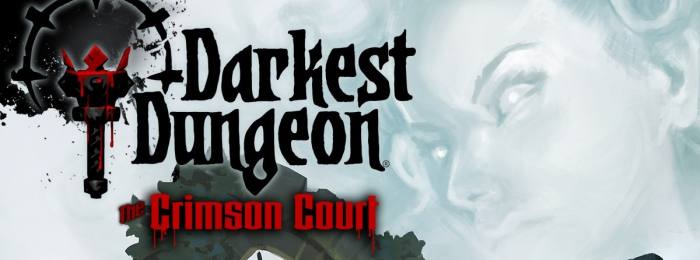





Καπιταλιστικη προβοκατσια.
Πρεπει να διαβασουμε Μπακουνιν και Μαρξ πριν το ξεκινησουμε; Ωραιο θεμα για παιχνιδακι γιατι απο το καφενειο, ολα ευκολα ακουγονται.
Πριν τελειωσω να διαβαζω το review, μου δημιουργηθηκαν αποριες για τι μπορει να συμβει με συγκεκριμενες αποφασεις και ποσο μακρυα σε αφηνει να πας το ιδιο το παιχνιδι.
Κουνελισια καραμπολα αλλα δεν πειραζει. πειραζει;
Επειδη το review με τραβηξε απο το αυτι, το εψαξα λιγο. Ενω αναφερεις οτι μπορεις να γινεις ο μεγαλυτερος καταπιεστης, η λεπτομερεια ειναι αυτη που τσακιζει. Εκτος απο την μυστικη αστυνομια, παιζει ενα act με το οποιο μπορεις να απαγαγεις πολιτες, φανταζομαι οχι για λυτρα.
Ο Κροποτκιν θα ηταν αντιθετος με αυτο.
Πιστευω οτι αυτες οι λεπτομερειες δινουν εναν ρεαλισμο. Δεν εννοω τον ρεαλισμο του RDR2 με τα καλαμπαλικια του αλογου.
Πιστευω οτι το παιχνιδακι πρεπει να ειναι ωραια εμπειρια.
[QUOTE=”lelos kounelos, post: 596961, member: 102768″]
Πιστευω οτι αυτες οι λεπτομερειες δινουν εναν ρεαλισμο. Δεν εννοω τον ρεαλισμο του RDR2 με τα καλαμπαλικια του αλογου.
[/QUOTE]
:solaire:
[QUOTE=”lelos kounelos, post: 596961, member: 102768″]
Κουνελισια καραμπολα αλλα δεν πειραζει. πειραζει;
Επειδη το review με τραβηξε απο το αυτι, το εψαξα λιγο. Ενω αναφερεις οτι μπορεις να γινεις ο μεγαλυτερος καταπιεστης, η λεπτομερεια ειναι αυτη που τσακιζει. Εκτος απο την μυστικη αστυνομια, παιζει ενα act με το οποιο μπορεις να απαγαγεις πολιτες, φανταζομαι οχι για λυτρα.
Ο Κροποτκιν θα ηταν αντιθετος με αυτο.
Πιστευω οτι αυτες οι λεπτομερειες δινουν εναν ρεαλισμο. Δεν εννοω τον ρεαλισμο του RDR2 με τα καλαμπαλικια του αλογου.
Πιστευω οτι το παιχνιδακι πρεπει να ειναι ωραια εμπειρια.
[/QUOTE]
Στα δικά μου πλεηθρού πήγα με τον σταυρό στο χέρι και δεν το υπέγραψα αυτό το έκτρωμα. Ωστόσο, όταν όλη η πόλη καταρρέει μια απαγωγή μπορεί πραγματικά να εξαρθρώσει τις αντιστασιακές οργανώσεις τάχιστα όπως είδα στο…δοκιμαστικό πλεηθρου με load. Το παιχνίδι έχει μπόλικα πράγματα εντεταγμένα στην εργαλειοθήκη της ηγεσίας και αφήνονται στην προσωπική ηθική στο αν θα εφαρμοστούν ή όχι – η υπερωρία πχ πήγαινε σύννεφο στην πόλη μου.
[QUOTE=”Grotenfrod, post: 596966, member: 103310″]
να εξαρθρώσει τις αντιστασιακές οργανώσεις τάχιστα όπως είδα στο…δοκιμαστικό πλεηθρου
[/QUOTE]
Δεν κρατηθηκες, το εβαλες το δαχτυλο στο μελι.